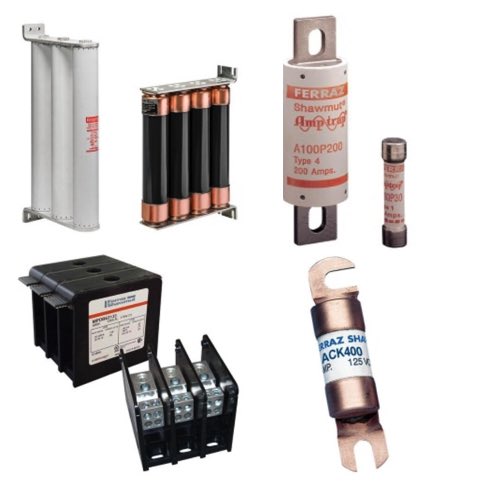Mersen Fuses

Mersen fuses are engineered to provide dependable overcurrent protection across a broad range of electrical applications. Designed to interrupt excessive current quickly and predictably, these fuses help protect electrical systems, components, and personnel from damage caused by overloads and short circuits. RSP Supply carries a full selection of Mersen fuses suitable for industrial, commercial, and residential use worldwide.
Mersen offers a comprehensive fuse portfolio that includes Class CC fuses, midget fuses, high-speed fuses, and time delay fuses. High-speed fuses are commonly used to protect sensitive power electronics such as drives, inverters, and rectifiers, while time delay fuses allow temporary inrush currents without nuisance opening. This range of options allows engineers and electricians to select the appropriate fuse type based on system characteristics and protection requirements.
In addition to fuses, Mersen provides complementary components such as fuse holders and power distribution blocks. Together, these products support organized and reliable power distribution in control panels, equipment enclosures, and power distribution units. Mersen’s overcurrent protection solutions are designed to maintain system continuity while providing precise and consistent protection under varying load conditions.
FAQs
Q: What are Mersen fuses used for?
Mersen fuses are used to protect electrical circuits and equipment from overcurrent and short-circuit conditions by safely interrupting excessive current flow.
Q: Does Mersen offer time delay fuses?
Yes, Mersen offers time delay fuses as part of its global product portfolio. These fuses allow temporary inrush currents while still providing overcurrent protection.
Q: What are high-speed fuses used for?
High-speed fuses are used to protect sensitive electronic equipment such as variable frequency drives, power converters, and semiconductor devices that require fast fault interruption.
Q: How do fuses differ from circuit breakers?
Fuses are single-use devices that must be replaced after an overcurrent event, while circuit breakers can be reset. Fuses are often simpler and provide very fast, reliable protection for individual circuits.
Q: Are Mersen fuses available for industrial applications?
Yes, Mersen manufactures fuses specifically designed for industrial, commercial, and power distribution applications, meeting a wide range of voltage and current requirements.
Why Buy Mersen Fuses from RSP Supply
RSP Supply offers a wide selection of Mersen fuses and related overcurrent protection components to support reliable electrical system design. Our product offerings include multiple fuse classes and performance characteristics to match diverse application needs. Customers rely on RSP Supply for trusted electrical brands, technical knowledge, and dependable solutions for circuit protection.

